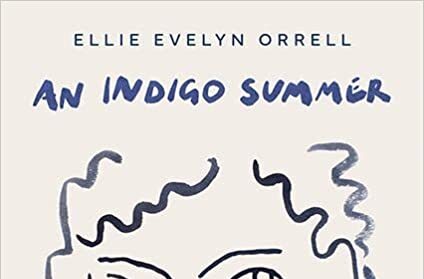Emma Schofield relaxes into the tranquillity of Ellie Evelyn Orrell’s memoir, An Indigo Summer, and finds a book which embraces the shifting emotions of grief, returning home and using creativity to heal.
Any book which opens with an R.S. Thomas poem will always stand a good chance of stealing my heart and in this case ‘Arrival’ makes for a fitting opening to a book which places the natural world front and centre in its story of grief, healing and returning home.
An Indigo Summer traces Ellie Evelyn Orrell’s memories of coming back to her family home in the village of Betws Gweful Goch in North Wales, following the death of her grandfather. Ellie’s return from university coincides with the return of her mother, Jeanette, who has been in Japan, learning the art of indigo dyeing. The different experiences of mother and daughter immediately collide as they find themselves unexpectedly thrown together in the aftermath of death. There is a timelessness about these early chapters, with Ellie noting that her “plans for the summer head do not extend beyond simply being at home”. Creativity has already taken up its place within the narrative. There is so much potential in the summer which stretches out ahead of Ellie and Jeanette, encapsulated in Jeanette’s unformed plans to translate her preparatory drawings into images on cloth, using the indigo.
The praise used in the marketing for the memoir describes it as “elegiac” and “lyrical”, and it is. The prose is lilting and soothing, moving at its own pace and carrying its reader along with it, but that also belies the complexity of the narrative that Orrell has created. Indigo Summer moves in waves, weaving together memories, sorrow and hope in a delicate balance which mirrors the ebb and flow of grief that will be familiar to so many of us. There are bursts of creativity and enthusiasm, intertwined with moments of stillness and appreciation for the beauty of the landscape around them.
The images are a story in their own right; simple, but vibrant, they juxtapose the vivid stains created through the process of indigo dyeing with the natural beauty of the blackcurrants and blueberries which are collected and transformed into “bubbling” jams and preserves. There is artistry even within the simplest of tasks in turning the freshly picked berries into jam and Orrell allows space to acknowledge that artistry, and also to revel in the enjoyment of the “deep-purple” jam which is created. Colour is everywhere, in Ellie’s memories of moments from her childhood, growing up in Wales, but also in Jeanette’s descriptions of her time in Japan and the little cafes she would regularly visit. There is appreciation for the power of the past, even when the call of the future resonates around Ellie and Jeanette.
That expression of creativity as a process which is often clunky and disjointed is also beautifully captured here. Spells of creativity are positioned alongside the acknowledgement that some days there are “blocks” and times when the pieces of the jigsaw do not seem to fit together as they should. There is a calmness in Ellie’s gradual realisation that it is okay not be creatively productive all the time; her acceptance that sometimes there is a lull is key to understanding how the memoir achieves its serene tone.
It’s not easy to write a narrative about returning home different. It’s a trope that’s deeply embedded within Welsh writing, both fiction and memoir, and one which has been often discussed and revisited. What An Indigo Summer offers is a fresh take on this trope. The narrative is female-centred, with the relationship between Ellie and Jeanette central to each of the memories which unfurl throughout the book. The rhythm and routine of the indigo dyeing process add a depth and dimension which prevent the memoir becoming insular. In fact, if I had a complaint, it would be that I’d have liked to have seen more images of the dyeing process. It’s a minor quibble, but the work is so central to the memoir that it would not have felt out of place.
An Indigo Summer is an extraordinarily mature debut from a writer from whom there is clearly so much more to come.
An Indigo Summer is published by University of Wales Press’ Calon imprint and is available now.












